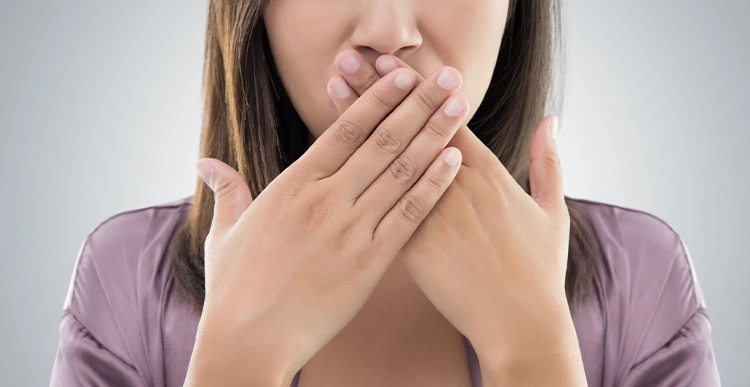How Does Bad Breath Go Away? Why Does It Happen?
Bad breath (halitosis) is a common problem that can bother both the person and those around them. It is normal to experience bad breath when you wake up in the morning, when you have been hungry for a long time or after consuming certain foods. However, if you have persistent and severe bad breath, this may indicate other underlying health problems.
In this article, causes of bad breath, how it can be remedied and in which cases a that you should consult a specialist we will discuss in detail.
What Causes Bad Breath?
Understanding the source of bad breath is very important to find the right solution. Bad breath is usually divided into two main groups: Intraoral causes and extraoral causes.
1. Intraoral Causes
The most common cause of bad breath poor oral hygiene. If teeth are not brushed regularly and correctly, the tongue is not cleaned and flossed, bacteria multiply in the mouth and cause bad odor.
The main causes of halitosis of intraoral origin:
-Dental caries and gum disease: Decayed teeth and gingivitis are one of the biggest causes of bad breath.
-Bacteria on the surface of the tongue: The surface of the tongue is favorable for bacteria to accumulate due to its recessed structure. Especially in the back of the tongue, bacteria that cause bad odor are concentrated.
-Tartar and plaque buildup: Inadequate brushing and flossing leads to bacteria accumulation and bad odor.
-Dry mouth (xerostomia): Saliva prevents bad breath by maintaining bacterial balance in the mouth. Insufficient saliva production (dry mouth) can cause bad breath.
2. Extraoral Causes
In some cases, bad breath not because of problems in the mouth, but because of different diseases in the body. can be caused by
Some of the extraoral causes:
-Digestive system disorders (reflux, stomach problems): Reflux, which occurs when stomach acid escapes into the esophagus, can cause bad breath.
-Tonsil stones Food particles and bacteria that accumulate in the tonsils can harden over time and form foul-smelling stones.
-Sinus infections: Sinus infections and nasal discharge can cause bad breath.
-Diabetes Irregular blood sugar levels can lead to the formation of substances called ketones and the appearance of an acetone-like odor in the mouth.
-Kidney and liver diseases: Advanced kidney disease can cause ammonia-like bad breath. If your bad breath persists despite regular oral care, to find out if there is a different underlying disease it is important to consult a specialist.
How Does Bad Breath Go Away?
The methods that can be applied to prevent and eliminate bad breath are as follows:
1. Proper and Regular Oral Care
✔ Brush your teeth at least twice a day. In the morning and evening, brush your teeth with a fluoride toothpaste for at least 2 minutes.
✔ Clean your tongue. You can use a tongue scraper or the back of your brush to remove bacteria from the surface of the tongue.
✔ Use dental floss and interdental brushes. It is very important to use dental floss and interdental brushes to remove food debris that accumulates in areas where the brush cannot reach.
✔ Use mouthwash. Antibacterial mouthwashes can reduce the bacteria that cause bad breath.
2. Pay Attention to Your Eating Habits
✔ Brush your teeth after pungent foods such as onions and garlic.
✔ Drink plenty of water. Drinking water increases salivation and reduces bad odors.
✔ Chew sugar-free gum. Chewing gum helps prevent bad odor by increasing saliva production.
✔ Limit excessive consumption of coffee and alcohol. These drinks can cause dry mouth.
3. Don't Neglect Regular Dental Checkups
✔ Get professional scaling. Tartar and plaque accumulation can cause bad breath; regular scaling protects oral health.
✔ Get caries and gum disease treated early. Gingivitis and caries, one of the most important causes of bad breath, should be treated early.
When Should You Consult a Specialist?
If you have bad breath:
If it does not go away despite regular tooth brushing and oral care,
If it has been going on for a long time and is severe,
If it is associated with stomach problems or other health problems,
It is important to consult a dentist or a specialist doctor.
Conclusion Can Bad Breath be Prevented?
Yes! A big part of bad breath proper oral hygiene and regular dental visits can be prevented by controls. However, in some cases, bad breath systemic diseases and may require medical treatment.
For a healthy and fresh breath:
✔ Clean your teeth and tongue regularly.
✔ Drink plenty of water and watch your diet.
✔ Visit your dentist regularly.
If you suffer from halitosis, we can offer customized solutions for you. from our clinic you can make an appointment.


